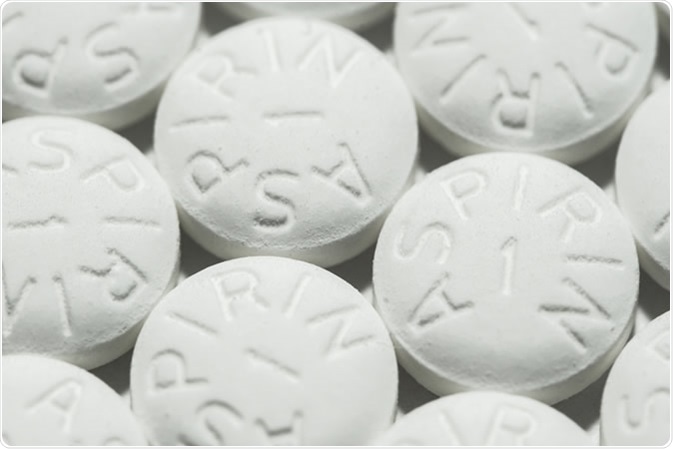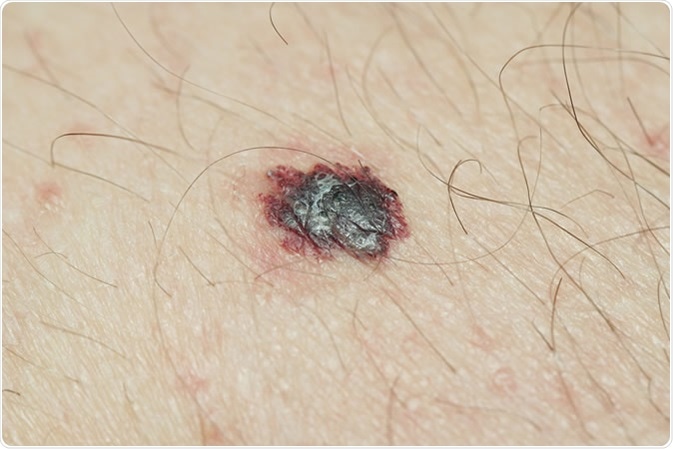Skip to:
Aspirin is among the most commonly used medications in the world. It is used over the counter to treat common causes of pain such as headaches.

Aspirin pills. Image Credit: Shane Maritch / Shutterstock
Skin cancer is among the most common of all cancers across the world. Three major types account for much of this cancer burden, namely, basal cell carcinoma, squamous cell carcinoma, and malignant melanoma (MM).
Low-dose aspirin is used to reduce the chances of blood clots in the heart; a condition linked to heart attacks, stroke and other disorders. However, the daily use of aspirin is associated with a host of side effects.
Gastritis is quite common, but in severe cases peptic ulceration may occur, which could cause bleeding into the stomach, brain or intestine. Such bleeding may often be profuse or occur in critical areas, and may then endanger the patient’s life.
Aspirin and skin cancer
Aspirin inhibits the enzymes cyclooxygenase (COX)-1 and 2. COX-2 regulates inflammation via prostaglandin synthesis, and is thought to control the development and progression of cancers. The inhibition of prostaglandin synthesis-mediated inflammation by aspirin is hypothesized to prevent malignancies by this mechanism. It has been postulated that this decreased risk could be related to increased COX-2 expression in squamous cell carcinoma.
However, the evidence regarding the link between aspirin and cancer risk is far from clear. According to one meta-analysis from 2015, aspirin was shown to be associated with a decreased risk of non-melanoma skin cancer but not melanoma. In 2018, a new study showed that men, but not women, with a 1-year or more history of aspirin use had an increased risk of melanoma.

A melanoma. Image Credit: Krzysztof Winnik / Shutterstock
In the 2018 study, conducted in the US, researchers gathered data on all patients treated at a large city hospital in Chicago with the following characteristics: the patients were between 18 and 89 years of age, had no history of MM, and had aspirin once a day for at least one year. These patients were followed up for five years or more. The researchers looked at the daily dose used, whether 81 mg (low dose) or 325 mg (typical dose), with other demographic characteristics, and for the development of malignant melanoma after one or more years of first seeing the patient.
The researchers concluded that taking aspirin once a day increases the overall melanoma risk, independent of the dose. Men had an 83% increased risk of developing melanoma, but there was no increased among risk among women.
One reason for the difference between results for men and women could be that protective enzymes, such as superoxide dismutase and catalase, are expressed at lower levels in males, compared with females. These lower levels suggest that a higher level of oxidative cellular damage might occur as a result of chronic aspirin exposure in men, which might contribute to the possibility of developing melanoma.
How will aspirin affect my risk of developing skin cancer?
Known risk factors for melanoma include sun exposure, fair skin, sunburn or tanning, a family history of skin cancer, ultraviolet exposure, and multiple moles. In recent times, the incidence of MM has gone up in the US.
Because the evidence is conflicting regarding aspirin use and skin cancer development, people should focus on well-established prevention for skin cancer. Covering up and consistent sunscreen use when exposed to the sun are the best methods by which to protect the skin from skin cancer and other short-term and long-term effects of sun exposure.
The evidence is not clear enough at this time to make a recommendation regarding aspirin intake and skin cancer risk. Aspirin use should be based on other factors, especially history of cardiovascular disease.
Further Reading
Last Updated: Jul 8, 2019